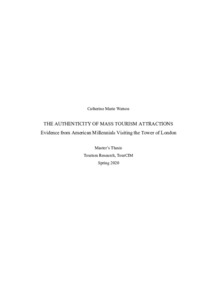The Authenticity of Mass Tourism Attractions: Evidence from American Millennials Visiting the Tower of London
Watson, Catherine Marie (2020)
Watson, Catherine Marie
Lapin yliopisto
2020
Julkaisun pysyvä osoite on
https://urn.fi/URN:NBN:fi-fe2020061142887
https://urn.fi/URN:NBN:fi-fe2020061142887
Tiivistelmä
The concept of authenticity has been profoundly researched within Tourism Studies with multiple theoretical approaches in existence. Authenticity is considered a key motivational driver for prospective tourists within tourism destinations and has an immediate effect on return visitor intentions. Changing tourism trends observe new ways of uncovering authenticity and with the new demographic millennial travelers (the future of travel), searching for low budget, genuine backstage experiences, is on the rise. Cultural tourism is where people explore or experience a different way of life, reflecting on traditions, ethnicity and objects that may be unfamiliar.
The presence of this concept in early theories of tourism has launched a vast discussion which continues in today’s academia considering Tourism Experience, Authenticity and Perceptions. It is the experience that will be the focus of this thesis, which aims to explore individual tourists’ perceptions of one of London’s most prodigious, commodified assets, the Tower of London and extend the interest of the concept authenticity. Guided by Wang’s (1999) constructivist typology, the research involves exploration of tourist recall and evaluates their observations through subjective recollection in relation to authenticity.
The empirical study was conducted with five millennial participants, investigating experiential data using qualitative methodology (in-depth interviews), and analyzed using content analysis. Tourists were asked to evaluate the authenticity based on their understanding and experience of the concept, and any authentic/inauthentic aspects they encounter. The findings and discussion focus on the role of perceived authenticity as a measure of product quality and as a determinant of tourist satisfaction. This study analyzes the tourists’ experience at the cultural heritage attraction, addressing research gaps in tourist experience and discussing London as a heritage brand.
The results revealed that a high perception of authenticity is desired and can be achieved even though commodification is present. Reconstruction is therefore a sustainable form of tourism development. Cultural authenticity is not impacted by the troubles of mass tourism, therefore, restoring, preserving and managing cultural buildings could fulfil the quest for authenticity. It was established that memorable experiences of London and the role of the American millennial tourist market has helped develop a tailored brand of heritage attractions in London for future tourists. Focusing on authenticity could help heritage managers and marketers better tailor their product.
The presence of this concept in early theories of tourism has launched a vast discussion which continues in today’s academia considering Tourism Experience, Authenticity and Perceptions. It is the experience that will be the focus of this thesis, which aims to explore individual tourists’ perceptions of one of London’s most prodigious, commodified assets, the Tower of London and extend the interest of the concept authenticity. Guided by Wang’s (1999) constructivist typology, the research involves exploration of tourist recall and evaluates their observations through subjective recollection in relation to authenticity.
The empirical study was conducted with five millennial participants, investigating experiential data using qualitative methodology (in-depth interviews), and analyzed using content analysis. Tourists were asked to evaluate the authenticity based on their understanding and experience of the concept, and any authentic/inauthentic aspects they encounter. The findings and discussion focus on the role of perceived authenticity as a measure of product quality and as a determinant of tourist satisfaction. This study analyzes the tourists’ experience at the cultural heritage attraction, addressing research gaps in tourist experience and discussing London as a heritage brand.
The results revealed that a high perception of authenticity is desired and can be achieved even though commodification is present. Reconstruction is therefore a sustainable form of tourism development. Cultural authenticity is not impacted by the troubles of mass tourism, therefore, restoring, preserving and managing cultural buildings could fulfil the quest for authenticity. It was established that memorable experiences of London and the role of the American millennial tourist market has helped develop a tailored brand of heritage attractions in London for future tourists. Focusing on authenticity could help heritage managers and marketers better tailor their product.
Kokoelmat
- Pro gradu -tutkielmat [4928]
